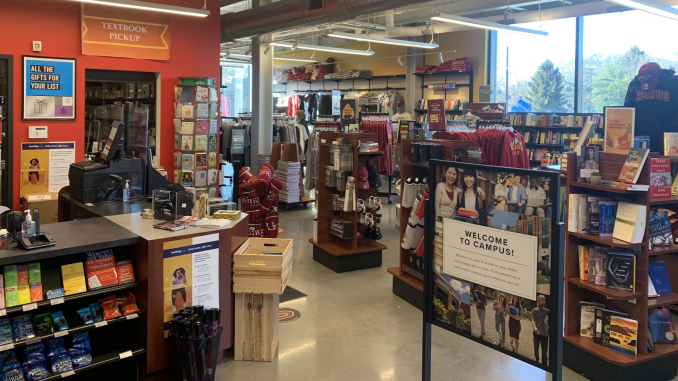
Morgan Mason (momason@ursinus.edu)
The new Ursinus bookstore is conveniently located in the recently constructed Schellhase Commons Building. Completed in 2020, the facility includes an admissions center, Starbucks, various collaborative study spaces, and of course, the college bookstore. Walking into the bookstore, however, you won’t see many books. You’ll see t-shirts and hoodies lining the walls.
Bookstore Manager Susan Phillips expressed how little control she or her staff have over this disheartening situation, stating, “The bookstore has very limited space for books. Until January of last year, the bookstore did not carry books at all. We were able to use a limited amount of space under our main window to bring in a selection of trade books.” The books available at the bookstore are not ones Ursinus students are itching to get their paws on for classes this semester. They are books for recreational reading and children’s books.
The reason the bookstore can’t store and sell textbooks on campus instead, Phillips said, is that, “the bookstore would have to be nearly twice the size it is now to accommodate textbooks in the store. When we moved to the Commons, there was no longer enough space to accommodate textbooks in the store. We were fortunate to have been provided with a program where the textbooks can be housed off-site. We share in the frustration that this program has caused some students. It has not been a perfect alternative. We continue to look for other alternatives to serve students better. However, bringing textbooks back to the bookstore like we did at the previously larger sites is not a viable option. Perhaps as textbooks become more and more digital, we will find an alternative that is closer to what students were accustomed to.”
For now, this means the bookstore orders books for classes once students request them. Recently, students ordering books have had to wait due to shipping delays from third-party publishing companies. For example, students in upper level English courses, such as Dr. Matthew Kozusko’s Shakespeare Remakes course, are used to high volumes of reading, but still don’t have all of their materials more than a month into their semester. Professors must shift their schedules around with students lacking course materials, and students are confused about why their books aren’t at the bookstore.
Kara McShane, Department Chair of the English Department, expressed her concern on the matter, saying, “ordering that far ahead isn’t always practical as students make changes to their schedule during add/drop. I have students still lacking textbooks in a pretty fast-paced class. It’s quite literally a barrier to their ability to be successful.” Ava Compagnoni ‘23 expressed her frustration, stating, “I just don’t understand why a bookstore doesn’t sell the books we need for class. It is an extreme inconvenience.”
The process of selecting books that are in the bookstore does not fall on one person’s shoulders. Phillips explains, “Barnes & Noble supplies us with a list of best sellers. The staff selects books from their areas of interest. [One staffer] has been particularly helpful adding to our books from diverse authors. The Manager (Susan) selects books from lesser-known authors and debut authors that she thinks the customers might find interesting. We also have campus authors represented, professors that have published as well as students. We recently added an Indigenous author’s section. We also have a selection of LGBTQ+ authors.”
It is good news that the bookstore is creating an environment of cultural representation, especially surrounding literature. But as we create these necessary spaces on campus, we are faced with the threat of phasing out access to the educational resources that help students thrive in a competitive academic climate.
Nor is the promise of digital texts a cure-all. Preference between digital and physical copies is, of course, a matter of personal preference. But as students, so much of our lives are spent on our screens. Moving away from physical textbooks pushes some students away from interacting with their reading material. Dr. McShane drives home this point, stating, “most of us do engage more passively with digital books than physical ones. Annotation systems are still a little clunky, and for many of us, reading digitally puts us in the mind of scrolling, falling into hyperlinked rabbit holes, and skimming for information. It can impact our ability to really read closely, especially in courses where the language being used is the point.”
We hear you, Ursinus. The College’s goal with the Commons was to connect the school to the community, but right now the bookstore has created a barrier for the student body. Of course, we welcome our neighbors to pop in to grab a coffee at Café 2020. But how can we live together when our academic needs aren’t being met?
